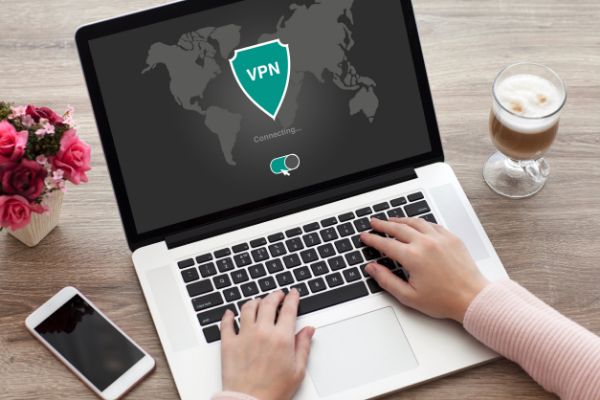Disclaimer: This post may contain affiliate links, meaning we get a small commission if you make a purchase through our links, at no cost to you. For more information, please visit our Disclaimer Page.
If you’re using a VPN to protect your privacy while online, you may be wondering if your landlord can see your internet history.
If your landlord is your ISP, they can see your internet history and monitor you. However, with a reliable and top-rated VPN solution, you can always prevent that from happening. Top VPN providers, such as NordVPN provide Onion Over VPN feature, which will provide you with privacy from your ISP.
Table of Contents
Does VPN protect from monitoring?
There’ are a couple of reasons it’s called a virtual private network (VPN). You’re subscribing to a premium VPN for a couple of reasons; one of them is to keep your online traffic private and protected.
VPNs are designed to hide several different things. Your internal protocol address (IP address) is the very first thing that they hide. Your browser history and location are two other things that a reliable VPN solution can hide. It’ll allow you to browse online on public websites but keep information about you hidden.
Here’s the thing; without using VPN, there are many things that your internet service provider (ISP) can track. Your ISP can always track a lot of things regarding your online behavior, including what you search, where you visit, what you click on, as well as what you download. Yes, all these are possible if you don’t use a reliable VPN solution.
However, once you start using a reliable virtual private network solution, there’ll be limits to what your ISP can see about you. Some VPN providers, such as NordVPN, now deliver an “Onion over VPN” feature. This offering combines the effect of the Onion browser with that of VPN to better prevent you from ISP monitoring.
If you make use of the Onion over VPN feature, your IP address will remain hidden even if your network gets compromised. That’s how reliable this feature is.
Generally speaking, a reliable VPN solution is capable of helping you hide several different things. I already mentioned some of them before, so let have a quick look at the rest of them below:
Search history
Your search history is one of the many things that a good VPN will hide from your ISP. VPN hides almost everything regarding your browsing histories, such as links clicked, search terms, and the websites you visited.
With VPN, your ISP will only get to see the IP address of the VPN you’re using. As for your IP address, the VPN will mask it, showing only the virtual one. With that, your ISP won’t be able to see your browsing history, your location, and other personal information.
IP address
You already know that your IP address is another thing that gets hidden from your ISP. If this happens, they won’t be able to understand exactly where you’re browsing from. Another thing about a hidden IP address is that it’ll prevent your ISP from getting information regarding your phone number, as well as your credit card details.
Travel accommodations
If you’re the type that travels a lot and books accommodation online, one thing you need to understand is that most travel websites link most of the information you search for with your IP address.
But what happens if your IP address is not accessible to your ISP? It simply means that your travel and accommodation information will be hidden as long as you have the VPN switched on.
The bottom line is that a reliable VPN solution can always protect your online data from being monitored by your ISP and other authorities. Apart from those listed above, other things that a reliable VPN solution can help you hide are your geolocation, information regarding your health conditions, and personal identifiable information (PII).
Can my landlord see my internet history if I use a VPN?
One of the few pieces of information regarding you that your landlord will see if you are using his Wi-Fi is your internet history. He’ll be able to monitor almost everything about your internet behavior, including how you interact with various websites. Apart from that, he’ll be able to sniff your traffic.
Furthermore, it doesn’t matter the type of connection that you use; whether wireless or wired, your landlord will still get to see your internet history. That’s so because, in this case, he’s your internet service provider (ISP).
To prevent your landlord from seeing your internet history, there are a couple of things that you can do. First, you can consider using a proxy, which will serve as a bridge, connecting your information packets to your chosen destination.
Onion router is another effective method that you can use to prevent your landlord (or ISP) from gaining access to your internet history when using his WiFi. The Tor browser is effective in this case; it’ll assign a new IP address to you by connecting you to volunteer-operated servers.
Another way to hide your internet history from your landlord is by using a reliable virtual private network solution. VPN will encrypt your internet traffic and mask your IP address, providing you with a virtual one. This way, it becomes pretty difficult for your landlord or ISP to understand exactly where you’re browsing from or the exact content you’re interacting with online.
As earlier mentioned, some VPNs provide the Onion over VPN feature. This is an advanced solution that will allow you to keep your IP address hidden from your landlord.
So, the bottom line is that a reliable VPN solution is effective to prevent your landlord from seeing your internet history.
Does VPN prevent router tracking?
Before I address this question, let me start by talking briefly about what router tracking is all about.
Router tracking is a common approach used by people in the networking technology field. They utilize this strategy to get various information, including network traffic.
Router tracking enables network managers to better understand their network. Apart from that, it also makes it easy to quickly and effectively troubleshoot their network to fix various issues.
One of the best ways to track routers and monitor network traffic is by using relevant tools, such as the Paessler PRTG Network Monitor. These tools allow network managers to better understand what’s happening in real-time on their networks.
With router tracking, network managers can always get various information regarding your internet activities, such as the websites you visit. Moreover, router history can always reveal the IP addresses of various websites.
Unfortunately, using a VPN solution might not be effective to prevent network managers from viewing your internet activities through router tracking. That’s especially true for people that use work WiFi.
Here’s why; when you make use of a VPN solution, along with a router, here’s what will happen below:
- People tracking your internet activities will be able to see encrypted packets being sent from your personal computer to the virtual IP Address assigned to you by the VPN.
- In addition to this, they can also see the encrypted packets coming from the VPN directly to your computer.
With that, it’s safe to say that your network traffic can always be tracked even if you end up using a VPN with a public router network.


